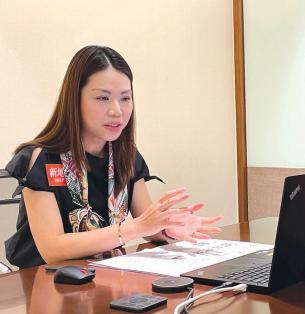SHKP Club has received enthusiastic support from its members since the launch of its diverse parent-child webinars. Recently, the club presented a brand-new "Accompany Your Kids on their Study Journey" webinar series, inviting experts to teach members how to select the right primary school for their child's learning needs, and ways to help children adapt to a new learning environment. The response was overwhelming, with participants actively seeking advice from speakers to better prepare their children for further studies. The highlights of the two webinars are shared below to assist parents in easing their child's journey from kindergarten to primary school, embodying the Bliss of Loving Home spirit.
Dr Eva Lau, Associate Head/Associate Professor for Department of Early Childhood Education, The Education University of Hong Kong, reminded parents of the importance of managing expectations during her webinar. She pointed out that it is normal for young kids to have difficulties adapting to changes after moving up to primary school due to the unfamiliar campus or new teaching methods. Parents have to gradually support their child's needs for their daily routine, social skills, emotions and learning, giving them enough time to get used to the new school life. She recommended using the "B.E.A.R.S." indicator to monitor children's adaptation to Primary One. This included BEHAVIOUR management and self-control, managing EMOTIONS and impulses, interest in learning and a positive ATTITUDE, following instructions and school ROUTINES, as well as good SOCIAL interactions with classmates. She believed that cultivating the five B.E.A.R.S. traits could better engage children in learning.
Dr Lau also cited a number of daily life examples and the following methods for parents to assist their children in entering Primary One.
-
Social and emotional adaptation: Arrange for your kids to meet with their new classmates the week before school starts. Seeing familiar faces can reduce adjustment anxiety when school starts officially.
-
Mental preparation: Run through primary school real-life cases at home, and find a special way to mark the first school day every year, such as taking photos in their new school uniform. This helps welcome a new learning experience.
-
Awareness and ability: Find opportunities to enhance your child's learning abilities in daily life, such as letting them buy things on their own to master addition and subtraction with the change. This enables children to put the knowledge learnt into practice.
-
Language skills: Have more parent-child communication to strengthen your kid's expression skills and self-confidence, which encourages them to speak readily when meeting new teachers and classmates in school.
-
Positive learning attitude: Parents should lead by example, showing curiosity and a willingness to try new things. Children will follow suit, acquiring new knowledge and adapting to changes in school with motivation and persistence.
-
Physical health: Establish a healthy lifestyle for your children and do more exercise. Having good health is fundamental for improving concentration and learning ability.
Q: How can parents encourage children to share more about the new life in primary school?
A: Building a solid parent-child relationship is a key. Parents can frequently share day-to-day lives with their children so that they become more open and willing to communicate. Try to make a habit of talking about the school day when the kids are in kindergarten, which helps them get used to sharing school life after reaching primary school. Open-ended questions and discussions about different situations encountered in school can encourage kids to describe things in more details, giving a better understanding of their learning progress and adaptation.
Q: What advice do you have to help children with different personalities to adapt to Primary One?
A: Observing the child's performance carefully to understand their strengths and weaknesses in different areas of adaptation so that corresponding support can be provided. Parents should try not to worry. During the transitional period between kindergarten and primary school, it is important to avoid focusing solely on academic performance. It is better to discover and appreciate the growth and progress demonstrated by kids during the process because compliments are significant to their adaptation.
Please click here for more webinar highlights (in Chinese only).
Senior education consultant Ian Tsang shared a range of practical information for Primary One admission in his webinar. This included the application procedures, the Discretionary Places Admission stage application and Points System, the quotas and allocation for the Central Allocation stage, as well as the admission schedule. Parents could fully understand the school system and learn about the techniques in handling their child's primary school application.
Ian also compared the features of government, aided, Direct Subsidy Scheme (DSS) and private primary schools in Hong Kong, explaining each type of school in terms of school philosophy, teaching methods, curriculum and academic requirements. Such details were useful to parents for selecting a suitable school in line with their child's individual characteristics and development. Additionally, he advised parents to consider DSS and private primary schools with different interview requirements, and shared case studies demonstrating how to choose a school that caters to child's character, abilities and learning needs, such as:
-
Children with a strong level of concentration, that actively share the details of their classes, that can complete homework independently, and that love to read books, may consider a school with higher academic requirements and that encourages broad academic development.
-
Children who are devoted in class, but need an adult to remind them to do homework, and that like to read with parents, are better suited to schools requiring normal to above-average academic performance and those without too many extracurricular activities.
-
Children with a lower level of concentration, that need to be accompanied by an adult to complete homework and that do not have a regular reading habit may enroll in a lower-pressure school, where more focus is put on uncovering and developing students' interests and strengths over academics.
Q: How can we deepen a child's understanding of their new school?
A: Parents can bring their child on a school visit in advance, giving them an idea of the school and surrounding environment. Browsing the school website together with the kids at home to learn about the classroom and teaching environment via photos and other introductions can improve familiarity too.
Q: How can parents assess whether a school is suitable for their child?
A: Paying more attention to the character of the kids as they study, and learning about child development and child psychology are useful. This facilitates a better understanding of children's learning needs and levels. Parents can also regularly check the content and direction of Education Bureau courses, and visit their school of interest to see how the primary students are after class, to help gauge the suitability of the child and the campus.
Please click here to watch the webinar video (in Chinese only).



